AudioCulture
The noisy library of New Zealand music
Te pātaka korihi o ngā puoro o Aotearoa
Clive Cockburn
The 1960s was a great decade for pop music and Wellington was the recording capital of New Zealand. The HMV label was based in the city and the company was the dominant player in both record wholesale and retail. In 1966, the company purchased their own studio in Wakefield St and started turning out hits from local bands including The Fourmyula, The Avengers, Tom Thumb, The Simple Image, Quincy Conserve and out-of-towners Mr. Lee Grant, Shane and Allison Durbin.
Over time the New Zealand pop gems of the 60s have shone brighter while the recordings of 70s rock that followed the pop explosion now pale in comparison. When it came to making pop, HMV had an enviable line-up of talented groups and numerous producers queuing up to get into the studio.
In his book Positively George Street, Matthew Bannister recalls Andrew Brough and friends performing The Avengers’ hit ‘Love Hate Revenge’ at the West Coast Punakaiki Festival in 1983. The first Avengers single ‘Everyone’s Gonna Wonder’ was recorded by Flying Nun supergroup the Pop Art Toasters (Martin Phillipps, David Kilgour, Mike Dooley etc.) in 1994.
After four years of pleasant and at times powerful pop, The Avengers split in 1970. “Afterwards I was embarrassed by it, for the first three or four years,” said Clive. “I’m very proud of it now.”
In 1966, The Avengers were put together by Ken Cooper, a Svengali-style manager who ran local venues. The Avengers were “handpicked” from various bands with the promise of a big “promotion”. Clive had been in The Mustangs.
“As a 13-year-old I wanted to be a rock star and my friend had his father buy him gear for a whole band, so I ended up being the lead guitarist. We went to Rongotai College and we practised in the school lunchtime. We’d practise our steps in front of the mirror and then go back to school.”
The Avengers were named after the TV show, after a radio competition where several winners (including a young Dalvanius Prime) suggested the winning name.
“We thought our songs were a bit wet compared to Cream and Traffic."
The memorable clothing from Vance Vivian’s mod boutique The Vault was, “a manager thing,” says Clive. “We chose to just go along with what we were told to do. I was just into the music.”
Looking at an old publicity photo: “Brown, paisley shirt with grey pinstriped pants, totally uncool, very funny,” said Clive. “We weren’t very into the fashions. The Vault gave us some clothes and we’d just throw them on.”
In 1967 The Avengers released their first single ‘Everyone’s Gonna Wonder’. They were finalists in the Loxene Golden Disc and in December they were presented with a Silver Disc for sales in excess of 10,000 copies of their debut single.
--
Listening to The Avengers now, it appears that NZ recording standards were up to international standards?
“We didn’t know. In The Avengers, I would have been 20 to 24. We didn’t really know much. We were just growing up. We were playing all the time, but the recording engineer was the late Frank Douglas. He was it.”
Were all your songs recorded at HMV’s Wakefield St studio?
“There’s one we did in Australia that’s not on the reissue compilation, our last single – it sort of got lost – nobody ever saw it again. ‘Love Is A One Way Ticket’, I wrote it.”
Were you still with HMV?
“I don’t know. We were so ignorant about these things. We’d just go along and record. We didn’t know what happened.”
You didn’t know much about royalties and record contracts?
“No, I still don’t. We used to get paid $30 a week and it didn’t matter whether we played once a week or 10 times a week, which was really bad news and when we were in Australia we played 14 times a week because we played four times on a Friday and Saturday nights. We started at 8.30pm – two hour gigs – and finished at 4.30am. It was incredible extortion of us poor little buggers. We were just there for the glory. But nobody knew us. We weren’t a big deal in Australia.
“God, they must have made some money out of us. Just before I got married I was sent the bill for the Vault clothing and we were meant to be sponsored. It was such rip off.”
Were you playing to a teen audience all the time?
“The biggest towns that we had were Wanganui, Napier and Dunedin. We’d go to Dunedin and play at a place at the Agriculture Hall; it was called the Milky Way. Sometimes we’d play to nearly 2,000 kids. That was just a dance. The dance would turn into a concert and then they’d stop dancing, they’d all come to front of stage and it would all happen.”
When The Avengers weren’t playing they were in a van or on a Cook Strait Ferry. Even on the boat there was work to do.
“We would reply to the fan mail on the Aramoana. That was our job.
“The Avengers got most of their TV exposure on Wellington shows like Studio One. Bookings in Auckland venues and TV shows like C’mon were not easy to get.
“We had to leave the country as it took two months to tour New Zealand and every time we went back to a town, the band we were playing with played all the tunes we played last time.”
Even your own?
“We didn’t play our own very much live, we were just a big covers pop band. It was a problem. We did want to play covers all the time, the Small Faces, Amen Corner etc. About four years ago they got some 60s bands together in Wellington and I played live ‘Out Of Sight Out Of Mind’ for the first time.
“We thought our songs were a bit wet compared to Cream and Traffic. Not so much ‘Love Hate Revenge’ but ‘Everyone’s Going to Wonder’ was a pretty naff little song in a lot of ways.”
An American hippie passing through Wellington, Chris Malcolm, wrote the band’s first two singles but soon their HMV A&R man would source most of the band’s material from the company’s foreign repertoire.
“Nick Karavias would see what was being released in the country and when it wasn’t good enough, he’d give it to us to us and say ‘make it better’. Usually they were B-grade songs to start with.”
Were many compositions your own?
“Three or four. They are just jokes. ‘Flower Girl’ is the first thing I ever wrote. ‘Daniel The Postman’ I wrote when the Wahine went down. I lived in a house on the sea, Days Bay, Eastbourne. The house got wrecked on Wahine day. I was 21 and I went back and the sea had come through it, there were seashells under the lino and I can remember playing the piano and playing tricks with words.”
Nick Karavias: “You’re not a bloody blues singer, you haven’t got a bloody voice!”
When Clive got a bit intense recording ‘Morning Dew’, Nick Karavias in the control booth put his pop star in his place. Clive does Karavias in his best Romanian accent: “You’re not a bloody blues singer, you haven’t got a bloody voice!”
Did HMV decide what you would record?
“They did completely. But what was so good about it. We’d record all night at HMV until three or four in the morning. We were incredibly lucky. Then we’d go to Step-A-Side, a little takeaway place by the Basin Reserve and have our hamburgers and waffles. It was run by two Greek guys, Costa and Lucky. It was the centre of everything. It was the late night place, we were always there. We saw the sun come up over Basin Reserve so often.”
You said you were “kids”, you were 20 or older!
“But we were naive. I guess we thought if you looked after the music everything else will look after itself. The way we were paid was ridiculous.”
Singers Mr. Lee Grant and Allison Durbin also recorded slick, big-selling pop hits in the Wellington HMV studio.
“She worked with Howard Gable who became her husband and Peter Hitchcock was the engineer. Peter Hitchcock did everybody except The Avengers and Val Murphy who became my wife.”
Why didn’t you work with Gable?
“We would have liked that. He did Simple Image and Fourmyula. The other camp.”
How could there be “the other camp” in the same town?
“There were two camps in the same record company.”
Did you have a lot of input into the production?
“Totally, as far as the arrangements went, we just did it. The producer didn’t arrange a note.”
It is quite obvious, in terms of arrangement, that you liked The Beatles.
“It was the way you did it. I don’t know if it was The Beatles. We played 72 Beatles songs at one stage. We were much more Beatles than Stones. We didn’t play Beach Boys which surprised people, because in a way, we were a harmony band.
"We played 72 Beatles songs at one stage."
“It was the natural thing to do. That was the way you sang, you always put in a harmony part. There was a John Lennon part and a Paul McCartney part and maybe a George part down the bottom. Sixties music was made up of a lead line and a high harmony. The Hollies were great. The Finns do it. We didn’t do anything consciously, we didn’t say let’s be like The Beatles, we certainly didn’t do that.
“Dave Brown [he sang 70% of Avengers’ leads] is an unsung hero because if I listen back to that stuff, he had a great voice, really high and really hard. He was like the Pope, he was so correct, he was the one who always packed the van and folded his undies.”
Were you influenced when the Sgt Pepper’s album came out?
“I guess so, we used to open on the Loxene Golden Disc tour with ‘Sgt Pepper’s Lonely Hearts Club Band’. We would have been influenced but subconsciously.”
I thought ‘The Days Of Pearly Spencer’ might have been influenced by the Sgt Pepper’s album.
“No, we just listened to the original. That’s the way it went.”
Did you use a Mellotron on it?
“No. The sound is a Hammond Organ [me] and a piano [John Charles]. He was one of our musical directors. He was a composer. He was a million years old, about 28. Terry Crayford was the other one, and Terry still looks on me as a young kid who was slightly out-of-tune.”
Did you enjoy the 1967 Loxene Golden Disc Tour?
“We had a great time. Larry’s Rebels, Sandy Edmonds and the Clevedonaires. Larry’s Rebels were great. The quality of their production was phenomenal. Clever guys. Johnny the guitarist was really good. Larry was good.
“Other people in Auckland were really good. The La De Da’s were fantastic, great band, very good live. These guys were always further out than us. We were sort of poppy. Larry’s Rebels were poppy but their image was slightly ‘bad boys’ too. Even though they were well-dressed. [laughs]”
Was your pop image different from the way you were live?
“Very different. We had this boy next-door image, but we weren’t really. But we weren’t a heavy rock group either.”
Did you play guitar or organ on stage?
“Both. When I was a kid I played classical piano. I never really got off on piano. It doesn’t sing like a sax or a violin or a voice. I got much more excited by guitar. I was playing guitar in the band. Then we got an organ when organs became part of a band’s line-up (The Animals, Procul Harum), but when guitar solos came I along I played them. So I used to play organ with either the guitar hanging around my neck or sitting on the organ.”
Who were the local competition in Wellington?
“Live – Sounds Unlimited and Quincy Conserve. But the recording bands were the Simple Image and The Fourmyula. We never ever saw them, maybe two or three times we worked the same venue.
“Wellington was quite a good scene. We’d play at The Place (Willis St/ Chews Lane) and then we’d pack up and play at The Platterack (Willis St, opposite Village). The Platterack was really late and really rough and one of the nights I remember, Max Merritt and The Meteors walked in the door, and they were really old, about three years older than us.”
Did you meet the other HMV acts in the studio?
“No. I’d like to have. Mike Farrell [Tom Thumb] – I loved him as a guitarist – I’d loved to have known him more. Recently I’ve met Rick White [Tom Thumb], he’s a classic guy, he’s so funny. Wayne Mason [Fourmyula] was the songwriter of the time. He was the guy who wrote the hits. These guys, we didn’t know each other at all.
“With all the promotion going on and being in the papers every week, we were recognised. I used to walk down Willis St with a grin on my face expecting people to recognise me even if they didn’t.”
In February 1969 after three albums, Electric Recording, Dial Triple A: The Avengers Live in Action and Medallion, The Avengers moved to Australia. Clive stayed less than a year.
“Australia was great. We played on Uptight TV show at eight in the morning. We went pretty well. When we went to Perth we were playing a lot of stuff like Three Dog Night. We had very long hair in those days and that was really advanced for Perth because Perth people were like 1956 bodgies. One night my hair needed a wash so one of the ladies passing through the place teased it out instead, so we went along to the gig and the guy nearly never let me in because he thought I was a fire hazard. We had a great time in Australia we were miles away from management. We were a good, strong and powerful band.”
Who was the band’s leader, the band fascist?
“I was a terrible fascist. I was very ambitious.”
You couldn’t hold the band together?
“By that time I’d been put in my place a few times. I didn’t feel so good about what I did. When people like Jimi Hendrix came along – who is this guy? He was just wonderful. Hendrix changed everything. Clapton came along – we used to play things like Cream and Traffic – they were great.
“When Dave Brown became ill, he was replaced by Australian John Pugh. This little chap had a reputation for being incredibly powerful and splitting bands up, he joined and did exactly that.
“That’s when it all split up, it became deep and meaningful and serious after that and Hank and Eddie started playing jazz rock, that wasn’t my thing. It was time to get come back and get a real job. Also in The Avengers it was very hard to write songs, which I wanted to, because we were always sleeping in the same room, there was no privacy from each other, or travelling in the van. We never ever stopped.
“We’d play late and even if they only played to midnight or two in the morning, they thought they could sleep all day and that used to get right up my nose. I had to leave the band to write songs.
“I had nothing to stay in Australia for, so I came back here and got a real job. I was a postie, then I worked in television [Clive helped to name Grunt Machine and wrote the late 70s TV One news theme]. I directed for three or four years [including the first Ready To Roll pop show] and then when my marriage split up, I went back to music because it was the only thing that really gave me a buzz.”
Not addicted to the adulation of live performance, Clive returned not to playing live music but to composing music.
“When I was working in television I wrote a couple of successful rock operas, Jenifer (1971) and Valdramar (1974). Then I did the Close To Home panto in 1978. But I couldn’t arrange it so I got Carl Doy to arrange it and then I thought, ‘I want to do that stuff too’ so I went to music school in the USA when I was 32.
“I went to the Dick Grove Music Workshop in LA. That changed my life. It was a most amazing year, 1979. This guy talked to class for five hours a day for six months on harmony and it was fun. In the second six months we had amazing guest teachers like Henry Mancini, big band legends like Billy May. That really changed my life.”
Clive then returned to the reality of living in New Zealand.
“It took me about 10 weeks to get my inferiority complex back and feel bad about myself again. We’re very self-effacing here.
“I became the in-house arranger for the Rodger Fox Big Band but I couldn’t make money doing that so I started knocking on doors of advertising agencies. The 80s was really good for advertising, there was hardly a break when I didn’t have an ad on.
“After personal tragedy at the end of the decade, I made the move into composing music for film and TV documentaries."
In 1980, Clive spoke to journalist Wayne Munro (8 O’Clock Sept 20), who wrote, “He sums up the sixties as a time when bands certainly didn’t get rich, but did have a lot of fun. The fan adulation was, he remembers fondly, ‘fantastic’. Like the day kids mobbed the group – and Cockburn was pushed underneath a bus (a parked one). He believes the new emphasis on pub entertainment has robbed the local scene of the mob scenes, the screaming fans. ‘It’s kept young kids away from the gigs. Now the groups are playing to cynical old, 20-year olds, and it just doesn’t happen.”
For Clive Cockburn the arranger/ composer, The Avengers playing the Nelson YMCA Xmas contract – 23 nights in a row playing four hours per night, 100 songs per night – is a very distant memory.
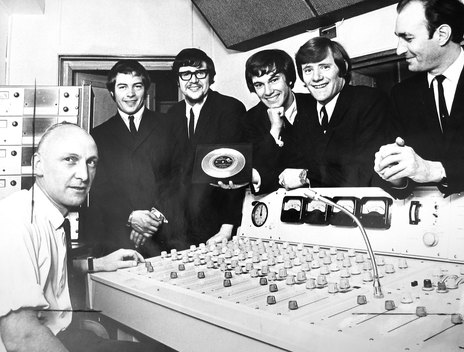
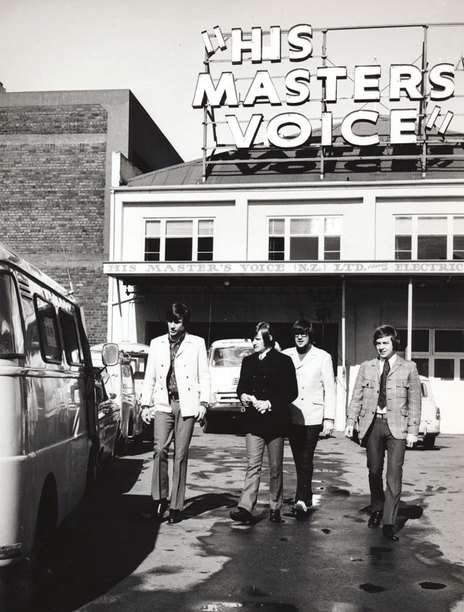
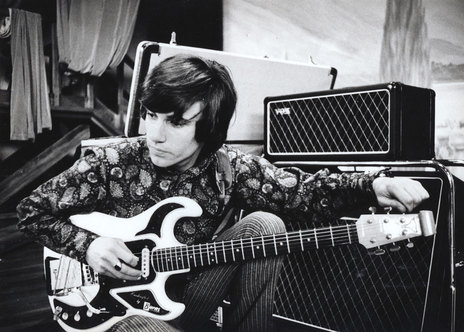
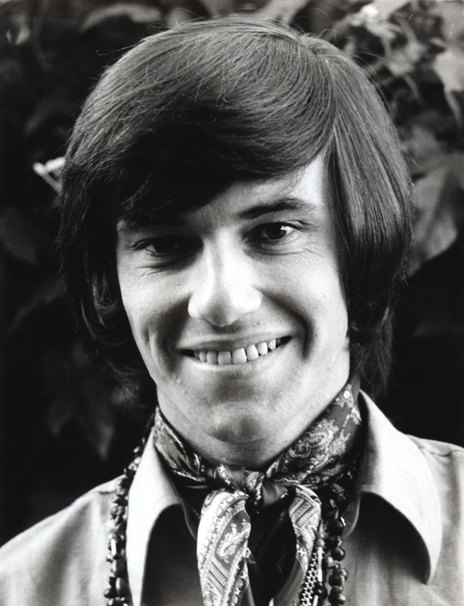
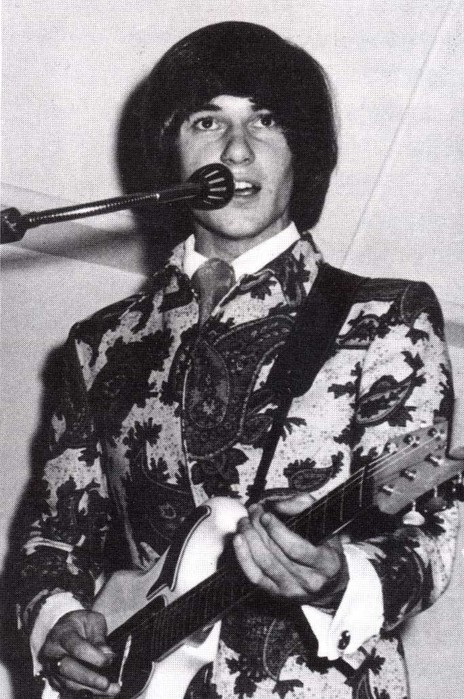
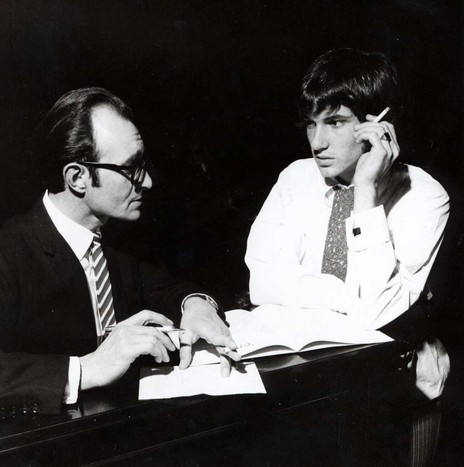
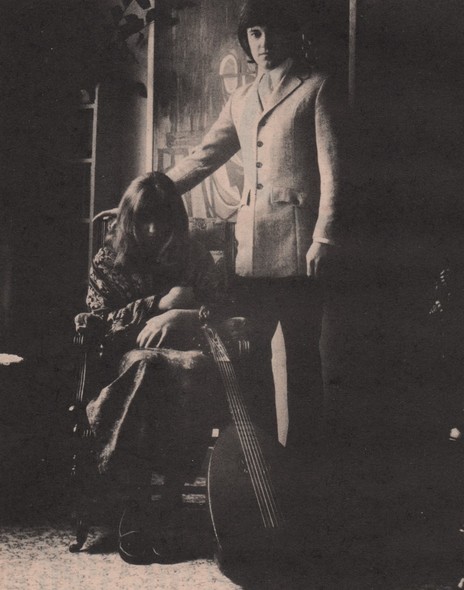
HMV
EMI
Columbia
Visit our sister site
NZ On ScreenMade with funding from
NZ On Air